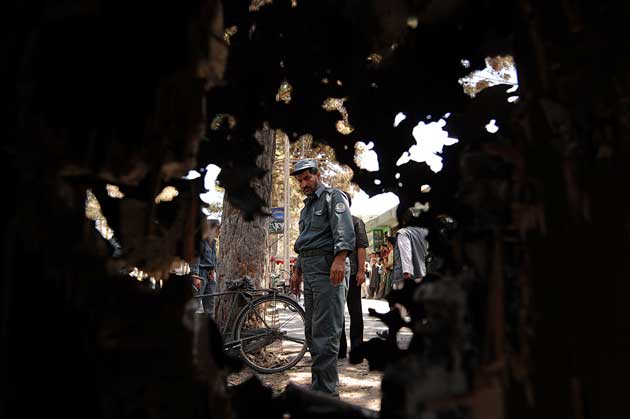Afghanistan spiralling back to days of Taliban, say charities
Terror attacks spreading into areas that were previously thought safe. Jerome Starkey reports

Violence in Afghanistan has reached record highs, with unprecedented numbers of civilian casualties and terror attacks spreading into areas once thought safe, a coalition of charities warns. In a damning indictment of the international community's effort to stabilise Afghanistan, more than 100 aid agencies claimed security is worse now than at any time in the past seven years.
"There has been a surge in the number of civilian casualties caused by all sides, a spread of insecurity to previously stable areas, and increasing attacks on aid agencies and their staff," the statement from their umbrella organisation Acbar said.
The group represents 64 international aid groups with projects inside the warring country, including Oxfam, Mercy Corps and Save the Children, as well as 36 Afghan charities.
There are almost 53,000 Nato-led troops across Afghanistan, trying to boost security while, "paving the way for reconstruction and effective governance". But the Acbar report states: "So far this year, the number of insurgent attacks, bombings and other violent incidents is up by approximately 50 per cent on the same period last year. The number of insurgent attacks for each of the months of May (463), June (569) and July is greater than the number of such attacks in any other month since the end of major hostilities following the international intervention in 2001."
In Helmand, where most of Britain's troops are based, the figures are even grimmer. The UK lost 13 soldiers in June, more than three times the attrition rate in the same period last year. They have already lost 28 soldiers this year and 114 since the US-led invasion in 2001. The statement continues: "This year, 2,500 people have reportedly lost their lives in the conflict and whilst exact figures are not yet available, this could include up to 1,000 civilians.
"According to initial estimates, there have been more than 260 civilian casualties in July of this year, higher than any other month in the past six years."
The report blames the Taliban insurgents for roughly two-thirds of the civilian casualties, but adds: "The increased number of air strikes by international military forces, which are up by approximately 40 per cent on last year, has also contributed to the rising civilian death toll."
Afghanistan's President, Hamid Karzai, has repeatedly warned international troops that killing innocent civilians risks eroding their fragile popular mandate. Last summer he branded the number of civilian casualties and arbitrary house searches "unacceptable". Last month he ordered an investigation after reports that 15 civilians died in a US airstrike.
Claims have since surfaced of 23 wedding guests dying under American bombs. This week, two children were shot dead when their car got too close to a military convoy.
The statement points to increased Taliban activity across the country. In the most volatile southern and eastern parts, the report warned, "insurgents are mounting an increasingly vigorous, systematic terror campaign".
It added: "Insecurity has spread to areas which were previously relatively stable in parts of north, north-west and central Afghan-istan, including to provinces close to and bordering Kabul."
The UN spokesman in Afghan-istan, Aleem Siddique, said: "The humanitarian challenge in Afghanistan continues to grow. In the past six months alone, criminal gangs have attacked 12 UN humanitarian convoys, resulting in the loss of food for thousands of the poorest families."
The Nato-led International Security Assistance force admitted violence had increased, but the spokesman, Mark Laity said: "The overall view is that we are seeing more violence, but pretty much in the same places. Some times it expands into new areas, but when it does it tends to be temporary."
He said the increase in violence was partly a reflection of Nato's increased troop levels, and partly because of Pakistan's cease-fire with insurgents on their side of the border has left them free to concentrate on Afghanistan.
"We have gone from 30,000 to 50,000 troops and we are generating more activity because we are taking on the insurgents," he added. "A large proportion of the violence has been caused by cross-border activity.
"This year, it has become even easier for the insurgents to move across the border from Pakistan, which they are able to use as a safe haven."
Figures from the Acbar report
2,500
Reported number of lives lost in conflict so far in 2008.
50
Approximate percentage increase in violent incidents from same period last year.
569
Insurgent attacks in June alone.
40
Approximate percentage increase on last year in international military air strikes.
13
Number of UK soldier skilled in June.
114
UK soldiers killed sincethe 2001 invasion.
53,000
Number of Nato-led troops in Afghanistan.
Join our commenting forum
Join thought-provoking conversations, follow other Independent readers and see their replies
Comments
Bookmark popover
Removed from bookmarks